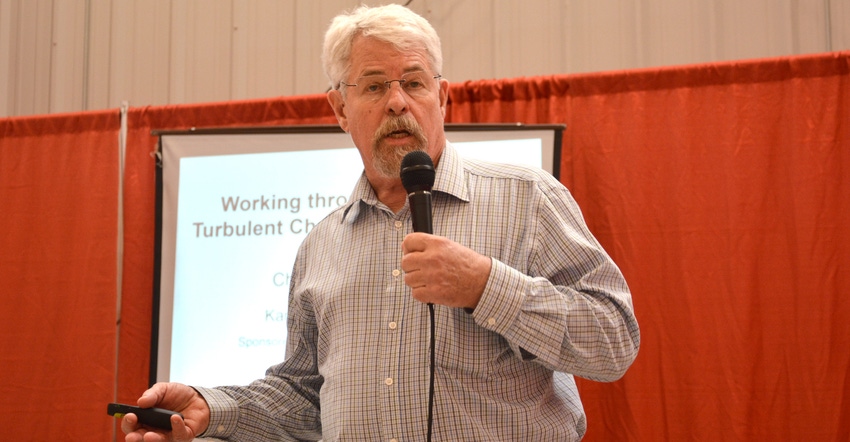
Kansas farm families have been through tough times before — the Dust Bowl, the droughts of the 1950s and 1970s, the financial crisis of the 1980s.
They have also been through solid good times, none more solid than in the years from 2011 to 2014 when commodity prices hit record highs, oil and gas prices were rising (to the benefit of landowners with mineral rights) and land values were soaring.
In 2015, the bad times returned with a steep crash of farm income as commodity prices toppled from lofty highs to lows that looked more like the 1980s. The resulting turmoil has farm families struggling with some hard decisions.
Charlie Griffin, a research assistant in the College of Human Ecology at Kansas State University, addressed some of those decisions with a presentation on “Working Through Times of Turbulent Change” at the 2017 3i Show in October.
Farm net income hit a high of $168,175 in 2011, Griffin says. In 2015, it plummeted to $6,700. In 2016, it recovered somewhat but remained at an anemic $43,161. The thing that net income doesn’t really show, however, is the cost of living — the amount of money Kansas farm families spend to pay for housing, transportation, food, clothing, household items, etc., which overall since 2011 has averaged about $65,000 a year, Griffin says.
“Net farm income is money after paying the expenses of the business, not money you have to spend after living expenses,” he says. “In fact, it basically is the money you have to live on without borrowing.”
In the good years, a lot of families actually took a vacation. They bought things they needed, such as new living room furniture, cars for kids to drive to school or new appliances. They put a new roof on the garage or maybe built a garage.
Since the crash, they have tightened belts. They have spent savings, sold assets, maybe taken a part-time job in town, then a full-time job. And now, as the downturn continues, many are asking: Do we stay or do we go? Do we hang on or do we sell? Can the kids come back or do they need another career? Is it time for parents to retire and give the next generation a chance to survive?
These are not new questions in a farm downturn, but in many families they are the first time this generation has faced them, Griffin says.
“We see kids that are going to another career after college but looking for a job that lets them stay close so they can help out on nights and weekends,” he says. “They want to begin to transition into management but how do you do that change? How do you separate ownership from management? And what about the siblings who took those jobs in other careers? What is fair to them in a succession plan?”
These issues are thorny enough, Griffin says, when they occur in ordinary times. They become even harder when they are driven by times of stress that force decisions under pressure.
Too often there is a lack of open communications or formal structure and processes that encourage thoughtful decision making.
“When you add the pressure of debt, divided or contested ownership of property, disputed division of income, questions of fair compensation for contribution and even in-law relationships and competing loyalties, you can see how difficult it can become,” he says.
In reality, Griffin says, every farm family will eventually face the need to weave the business life cycle into the rhythm of the family life cycle. There are tools that can help with the process, which is where organizations like the Kansas Agricultural Mediation Service can be helpful.
“We can help families work through some of those transitions, whether they are occurring from natural life cycle events or being forced by turbulent times,” Griffin says. “Whether it is helping the older generation learn to listen and accept new ideas or helping the younger generation understand the value of experience and lessons learned, the key is helping facilitate understanding and conversation.”
To learn more about the Kansas Agricultural Mediation Services, go to k-state.edu/kams/.
About the Author(s)
You May Also Like




